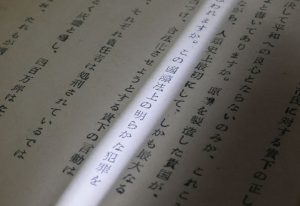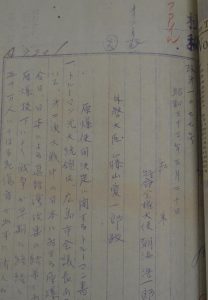Documenting Hiroshima 80 years after A-bombing: In February 1958, Truman’s remarks
Mar. 28, 2025
Strong protest against insult to A-bombing victims
by Michio Shimotaka, Staff Writer
On February 3, 1958, the Chugoku Shimbun evening edition carried a front-page article by a news agency reporting on remarks made by Harry S. Truman, U.S. president at the time of the atomic bombings. Mr. Truman reportedly had said he felt no regret whatsoever after giving the order to drop atomic bombs on Hiroshima and Nagasaki.
Mr. Truman had made the remarks on a U.S. television program broadcast on February 2. He had said it would have been foolish not to use weapons in the country’s possession that could win the war, and that he would not hesitate to use hydrogen bombs in an emergency situation in the future.
Sparking dispute with Truman
On February 3, Heiichi Fujii, secretary-general of the Japan Confederation of A- and H-Bomb Sufferers Organizations (Nihon Hidankyo), criticized Mr. Truman’s remarks. “That means more than 200,000 people died in vain. It’s proof that he doesn’t understand the reality of devastation from the atomic bombings,” said Mr. Fujii. Hiroshima’s governor and mayor also expressed their formal protest. At a special session of the Hiroshima City Council held on February 13, all 31 council members in attendance unanimously authorized an official statement of protest calling Mr. Truman’s remarks “a gross insult to the citizens of Hiroshima City and the victims of the atomic bombings.” That sparked a dispute with Mr. Truman himself.
On March 12, Mr. Truman published a letter addressed to Tsukasa Nitoguri, chair of the Hiroshima City Council, in which he criticized the Council’s stance by saying that if it had not been for the attack on Pearl Harbor by the Japanese military, the atomic bombings would not have happened. He claimed, without offering concrete evidence, that the bombings had prevented a combined total of 1.5 million casualties on the Allied and Japanese sides, emphasizing the necessity of the atomic bombings.
In response, in a plenary session of the City Council held on March 20, Mr. Nitoguri proposed sending a formal letter of protest, noting that Mr. Truman had shown no signs of remorse in his remarks, a proposal that was approved by the Council. In the letter, while expressing deep regret for Japanese war leaders’ “attempt to resolve the conflict through a terrible act of aggression in the attack on Pearl Harbor,” it also emphasized that the atomic bombings were a “clear violation” of international law.
“You committed an act of violence, massacring more than 200,000 non-combatants, irrespective of age or gender, and then tried to legitimize it. Do you dare consider that a humanitarian act?”
Mr. Nitoguri was one of those who took part in relief efforts and in burying the dead in his own district of Ushita (in Hiroshima’s present-day Higashi Ward) immediately after the atomic bombing of the city. At that time, the Hiroshima City Council included Masayuki Akita (introduced in this Chugoku Shimbun series in an article published on March 2), who had lost his oldest son, a third-year student at Hiroshima First Middle School (present-day Kokutaiji High School), in the bombing, as well as Shigeki Shibata, deputy mayor of Hiroshima at the time of the bombing, who had been engaged in aid and relief work.
Reaction in U.S.
The dispute also generated a reaction in the United States, with the Hiroshima City government receiving around 20 letters of both support and opposition from Americans by April of that year. Six letters in support of Mr. Truman included remarks imploring people not to forget about the attack on Pearl Harbor. In contrast, another letter mentioned the writer’s hatred of Mr. Truman for laughing off the atomic bombings.
On the other hand, when Japan Prime Minister Nobusuke Kishi was asked during a plenary session of the upper House of Councilors on February 14 about Mr. Truman’s remarks, he responded, “If true, they are regrettable.” Behind the scenes, Koichi Asakai, Japan’s ambassador to the United States, was urged to voice more opposition by a former official with the General Headquarters of the Allied Powers (GHQ). The official confidential telegram dated March 20, 1958, and addressed to Japan’s Foreign Minister Aiichiro Fujiyama still exists today.
The man who sent the telegram was Bonner Fellers, a military secretary to U.S. Supreme Commander Douglas MacArthur. He emphasized that linking Japan’s decision to surrender with the atomic bombings was contrary to fact. He also noted, given the relationship between Mr. Truman and the incumbent U.S. President Dwight D. Eisenhower, it was unlikely that the U.S. and Japanese governments would enter into a strained relationship even if certain steps were taken.
Mr. Asakai reported that, “I said in response that I appreciated it.” However, in the end, Japan’s government took no noteworthy action, with the proposal effectively being ignored. Mr. Truman neither retracted his remarks nor offered an apology.
(Originally published on March 28, 2025)









